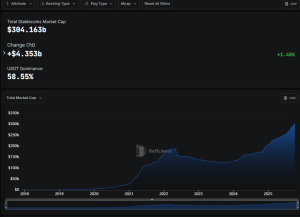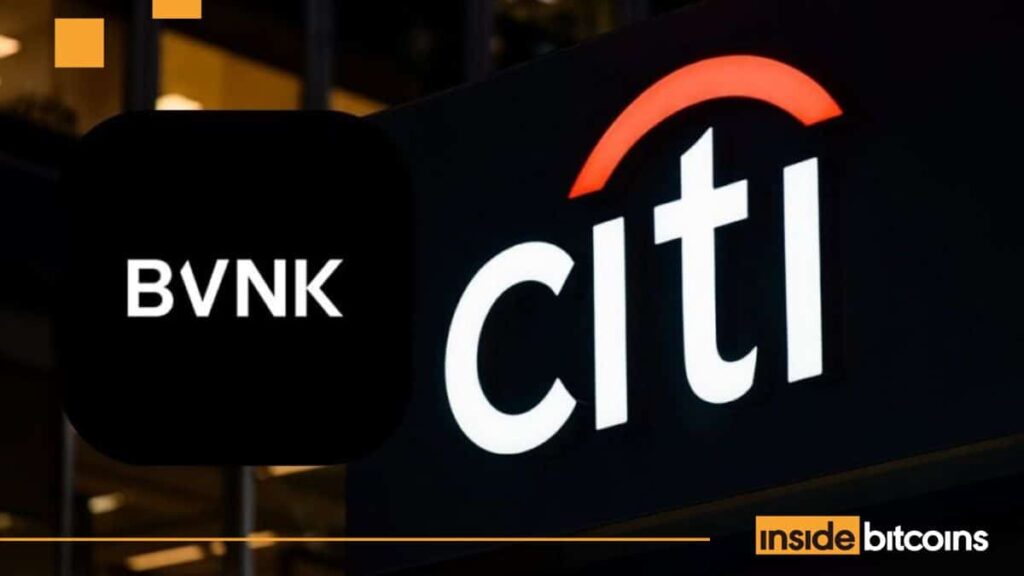Join our Telegram channel to stay up to date with the latest news
Citigroup has invested in stablecoin infrastructure provider BVNK through Citi Ventures, just months after warning that cryptos could drain deposits from traditional banks.
BVNK’s platform serves as an on-ramp for customers to move money between fiat and crypto. It is also backed by US crypto exchange Coinbase and fund manager Tiger Global Management.
The investment highlights TradFi’s move from caution to participation in the stablecoin ecosystem after the US GENIUS Act clarified regulations on their status.
BVNK valuation exceeds $750 million after Citi investment
TThe company declined to disclose how much Citi invested or at what valuation. But co-founder Chris Harmse recently confirmed that the investment had pushed its valuation well above the $750 million disclosed in its last funding round.
BVNK currently finds itself in a competitive market alongside newcomers such as Alchemy Pay, TripleA and even the well-established Ripple. All of these companies are vying to capture the lion’s share of the cross-border digital money market.
Amid strong competition, Harmse said BVNK had “experienced fluctuations in profitability” as the company invested in growth, but said the business was seeing momentum, particularly in the United States.
The co-founder added that the US has been the company’s fastest growing market over the past 12 to 18 months. This growth was spurred by the approval of the GENIUS stablecoin Act, which was signed into law earlier this year by US President Donald Trump.
In August, US Treasury Secretary Scott Bessent expressed support for stablecoin adoption and said these tokens will “expand access to the dollar for billions of dollars around the world.”
Implementation of the GENIUS Act is essential to ensuring U.S. leadership in digital assets.
Stablecoins will expand access to the dollar for billions of dollars around the world and lead to an increase in demand for U.S. Treasuries, which back stablecoins.
It’s win-win-win for everyone involved:…
– Treasury Secretary Scott Bessent (@SecScottBessent) August 18, 2025
The regulatory clarity provided by the GENIUS Act has boosted stablecoin market capitalization in recent months, while several financial institutions have since signaled plans to launch their own stablecoins.
Over the past week, the stablecoin sector capitalization jumped by approximately $4.353 billion, according to DéfiLlama data.
Following growth over the past seven days, the stablecoin’s market capitalization now stands at over $304.163 billion.


Stablecoin market capitalization (Source: DefiLlama)
In the last thirty days alone, $5 trillion in stablecoin transactions also took place, according to on-chain analysis of Visa.
One of the companies that has confirmed its stablecoin plans is Citi, whose CEO Jane Fraser said in July, the same month the GENIUS Act was signed into law, that the bank was considering issuing its own stablecoin. She also said that Citigroup was developing custody services for crypto assets.
Through these products, Citi aims to provide its clients with “the benefits of advancements in stablecoin and digital assets” securely by modernizing its own infrastructure.
Other companies are also exploring blockchain technology and tokenization. This includes Wall Street giant JPMorgan Chase, which launched its own stablecoin-like token called JPMD. Meanwhile, Bank of New York Mellon said it was testing token deposits. HSBC has also launched its own tokenized deposit service.
Citi had warned of a risk of deposit flight similar to that of the 1980s
Citi’s investment in BVNK comes after one of its analysts, Ronit Ghose, warned in August that growing interest in stablecoin payments posed a deposit flight risk for traditional banks, similar to what was seen in the 1980s when money market funds were abandoned.increased from $4 billion to $235 billion in seven years.
Major U.S. banking groups have already expressed concerns about yield stablecoins and have pushed for Congress to close what they called a “loophole” in the GENIUS Act.
The law prohibits stablecoin issuers from offering returns directly to token holders, but does not extend this prohibition to third parties or affiliates. According to banking groups, this opens the door for stablecoin issuers to circumvent the restrictions. For example, Coinbase currently offers its users returns on Circle’s USD Coin (USDC) stablecoin.
If this “gap” is not closed, banking groups predict it could result in up to $6.6 trillion in deposit outflows from the traditional banking system. This could then fundamentally change the way banks finance loans.
However, the crypto industry has opposed the banking groups’ claims, with many dismissing them as simply an effort by banks to prevent competition. Some, including Patrick Collison, CEO of Stripe, have also said that stablecoins will now force banks to offer higher returns to their customers.
Good article on the evolution of the stablecoin market structure. I would go further: yes, I think that stablecoin issuers will have to share the yield with others, but this is just an example. Everyone will have to share the yield. Today, the average interest rate on American savings…
-Patrick Collison (@patrickc) October 3, 2025
Related articles:
Best Wallet – Diversify your crypto portfolio
- Easy-to-use, feature-driven crypto wallet
- Get Early Access to Upcoming Token ICOs
- Multi-chain, multi-wallet, non-custodial
- Now on App Store, Google Play
- Stake to win a $BEST native token
- More than 250,000 active users per month
Join our Telegram channel to stay up to date with the latest news




